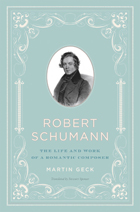
Arguably no other nineteenth-century German composer was as literate or as finely attuned to setting verse as Robert Schumann. Jon W. Finson challenges long-standing assumptions about Schumann's Lieder, engaging traditionally held interpretations. He argues against the belief that the "Year of Song" simply reflects Schumann's personal life. Finson also devotes attention to the form and metric structure of German poetry that is almost entirely new to the discussion of Schumann's songs.
Arranged in part thematically, rather than merely by strict compositional chronology, this book speaks to the heart of Schumann's music. Finson's sustained attention to performance, such as questions of whether two singers might divide performance of cycles or whether miscellanies form coherent entities, allows the reader to engage Schumann's songs in novel ways.
Finson brings original research and the most recent scholarship to the musically literate public and the expert alike. This represents the definitive work on Schumann's songs and the standard reference for any Schumann enthusiast.


There is no end to learning.
Originally published in1850, Advice to Young Musicians: Musical Rules for Home and in Life offered composer Robert Schumann’s (1810–56) combination of practical advice and poetic words of wisdom for young people beginning their musical education. Presented in aphorisms and short paragraphs, the book’s insights remain as valuable today as when it was written. Recognizing the continued resonance of Schumann’s words, world-renowned cellist Steven Isserlis, himself a writer of children’s books and many articles for young musicians, set out to rescue the work from history. Here, in this beautiful gift edition, he revisits Schumann’s work and contributes his own contemporary counsel for musicians and music lovers.
For this edition, Isserlis retranslated Schumann’s text and arranged it into four thematic sections: “On being a musician,” “Playing,” “Practicing,” and “Composing.” Each page is decoratively designed, and accompanying Schumann’s original quotation are Isserlis’s thoughtful and often humorous glosses. The book concludes with Isserlis’s own reflections on his life as a musician and performer: “My Own Bits of Advice (For What They’re Worth).” The result is a unique and thought-provoking book that will be treasured by aspiring musicians of any age.
READERS
Browse our collection.
PUBLISHERS
See BiblioVault's publisher services.
STUDENT SERVICES
Files for college accessibility offices.
UChicago Accessibility Resources
home | accessibility | search | about | contact us
BiblioVault ® 2001 - 2024
The University of Chicago Press









